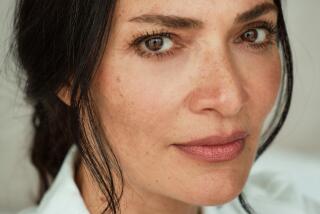From the Archives: Chabrol’s ‘Betty’ serves up a slice of dark, obsessive life
- Share via
Note: Five of French director Claude Chabrol’s later films — “Betty” (1992), “Color of Lies” (1999), “Night Cap” (2000), “The Swindle” (1997) and “Torment” (1994), all featuring some of France’s biggest stars of the era — screen as part of the “Chabrol 5 X 5” series. Below is The Times’ Aug. 27, 1993, review of “Betty.”
A well-dressed woman with a haunted look steps almost by chance into a small Paris bar. Hours later she leaves with a man she’s picked up, both of them smashed, headed for a place in Versailles he knows. Age 28, without a profession, a nonstop smoker and drinker, Betty, for that is her name, has the look of a one-woman lost generation, a wasted Piaf waif out on the town.
Although we learn a lot more about her during the course of “Betty,” it would be a disservice to the sensibility behind this film to say that we ever come to really understand why she acts the way she does.
“Betty,” the latest work from Claude Chabrol, functions instead as a fatalistic character study. It is the kind of rigorous slice of dark and obsessive life we’ve come to expect from the master French director, best known for films from the 1960s such as “La Femme Infidele” and “Le Boucher.”
Chabrol’s austerity as a director has kept him from becoming the kind of sentimental favorite his colleague Francois Truffaut was in this country. Yet by returning again and again, as he does in this, his 45th film, to themes of repression and sexuality, Chabrol has achieved a kind of control of his material that is remarkable.
“Betty,” which Chabrol scripted, is taken from a novel by the same name by Georges Simenon, a writer whose unsentimental concentration on abnormal psychology is a match for Chabrol’s style. The combination has resulted in a decidedly odd but mostly involving two-character study — short on plot but long on the intricacies of unpredictable human behavior.
That dive in Versailles that Betty is taken to is called Le Trou (the Hole), described by proprietor Mario (Jean-Francois Garreau) as a place where all the regulars are twisted. Betty catches not only Mario’s attention but also that of his girlfriend, Laure (Chabrol regular Stephane Audran), a hard-drinking widow who came to the city after her husband’s death and never left.
Laure, a former nurse, takes to Betty with an immediate and unsettling intensity. She procures this cipher of a woman a hotel room next to hers, draws her bath, cleans her clothes, finds her a doctor, even places her feet in cozy slippers. All she seems to want in return is Betty’s alcoholic companionship.
Laure tells Betty her story, and, gradually, through an intricate series of fragmentary flashbacks and long monologues, Betty’s comes out as well. The stifling bourgeois quality of her past life is carefully delineated, although, like most quasi-mysteries, “Betty” (Times-rated Mature) is more interesting and less schematic before we find out all the details of its protagonist’s troubling life.
Aside from Chabrol’s unadorned direction, the attraction of “Betty” lies in the performances by an accomplished pair of actresses. Audran is polished as usual, but the main focus is on Marie Trintignant as Betty. Trintignant, the daughter of actor Jean-Louis (who was once married to Audran), does a forceful job of creating a woman who, though all her secrets are revealed, is not much less of a mystery when this somber, unsettling film ends than when it began.
-------------
‘Betty’
In French with English subtitles
Not rated
Running time: 1 hour, 43 minutes.
Playing: Laemmle Royal, West L.A.
See the most-read stories in Entertainment this hour »
Movie Trailers
More to Read
Only good movies
Get the Indie Focus newsletter, Mark Olsen's weekly guide to the world of cinema.
You may occasionally receive promotional content from the Los Angeles Times.











